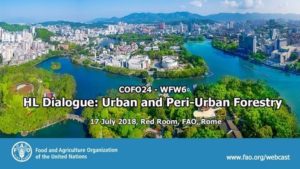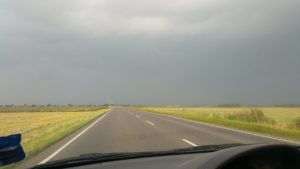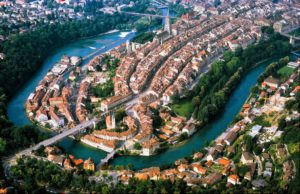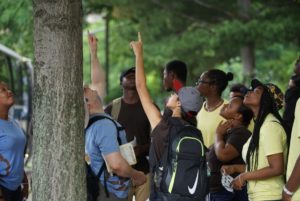Connecting cities with trees – COFO 24 Urban Forestry
 I live in an area of the UK known as the Fens. A flat and treeless landscape – just fields as far as the eye can see. The idea of ‘Urban Forestry’ (UF) is new to me, but interests me greatly.
[caption id="attachment_3410" align="alignleft" width="362"]
I live in an area of the UK known as the Fens. A flat and treeless landscape – just fields as far as the eye can see. The idea of ‘Urban Forestry’ (UF) is new to me, but interests me greatly.
[caption id="attachment_3410" align="alignleft" width="362"] The flat and treeless landscape characteristic of the Fens (UK).[/caption]
As a productive agricultural landscape, ‘foresting the Fens’ is not an option. But that doesn’t mean that the people who live there should be denied the right of experiencing a forested landscape. We just need to bring the forest to the urban environment.
There has been high-level discussions at COFO24 regarding UF, particularly around benefits of well-managed, accessible forest spaces. This is an important topic, with over half the world’s population living in cities and producing 75% of our carbon emissions.
Rapid urbanisation has outpaced capacity, leading to surrounding natural resources becoming depleted. The benefits of increasing forest cover in cities are clear: mitigating emissions, reducing energy needs and cleaning the air.
Although these services are important, I am interested in the less obvious effects of UF. What are the noticeable impacts of UF for the people actually living in cities?
[caption id="attachment_3425" align="alignright" width="373"]
The flat and treeless landscape characteristic of the Fens (UK).[/caption]
As a productive agricultural landscape, ‘foresting the Fens’ is not an option. But that doesn’t mean that the people who live there should be denied the right of experiencing a forested landscape. We just need to bring the forest to the urban environment.
There has been high-level discussions at COFO24 regarding UF, particularly around benefits of well-managed, accessible forest spaces. This is an important topic, with over half the world’s population living in cities and producing 75% of our carbon emissions.
Rapid urbanisation has outpaced capacity, leading to surrounding natural resources becoming depleted. The benefits of increasing forest cover in cities are clear: mitigating emissions, reducing energy needs and cleaning the air.
Although these services are important, I am interested in the less obvious effects of UF. What are the noticeable impacts of UF for the people actually living in cities?
[caption id="attachment_3425" align="alignright" width="373"] Bern, Switzerland[/caption]
UF contributes to our happiness. James Astill from the Economist stated “we form a sensory connection with trees, especially in a concrete environment”. Astill has lived in many cities, but says he remembers them from the nature and trees rather than landmark buildings. We struggle to connect to the ‘urban jungles’ we are inhabiting, but UF allows people to make that all important connection with where they are living and who they are living with. In Switzerland, forest parks have facilitated interactions between Swiss residents and young immigrants, a hard social demographic to integrate into existing communities.
UF will also play an important role in environmental youth engagement. A stand out comment made was that future leaders are growing up in these concrete jungles, devoid of trees and nature connections – yet they are the people going on to be responsible for ensuring future forests.
UF will be vital in educating the next generation and providing them an opportunity to interact and connect with nature. It will help to bring forest literacy back by giving young people a chance to engage their minds and spirits and rekindle lost connections with nature. Accessible urban forests will provide the ideal platform for school visits and recreational uses alike.
Bern, Switzerland[/caption]
UF contributes to our happiness. James Astill from the Economist stated “we form a sensory connection with trees, especially in a concrete environment”. Astill has lived in many cities, but says he remembers them from the nature and trees rather than landmark buildings. We struggle to connect to the ‘urban jungles’ we are inhabiting, but UF allows people to make that all important connection with where they are living and who they are living with. In Switzerland, forest parks have facilitated interactions between Swiss residents and young immigrants, a hard social demographic to integrate into existing communities.
UF will also play an important role in environmental youth engagement. A stand out comment made was that future leaders are growing up in these concrete jungles, devoid of trees and nature connections – yet they are the people going on to be responsible for ensuring future forests.
UF will be vital in educating the next generation and providing them an opportunity to interact and connect with nature. It will help to bring forest literacy back by giving young people a chance to engage their minds and spirits and rekindle lost connections with nature. Accessible urban forests will provide the ideal platform for school visits and recreational uses alike.
 It is evident that UF is something which will gain importance as urbanisation continues. I hope that in the future, I will be able to use what I have learnt at COFO24 in the Fens to increase UF cover and give people the chance to interact with trees.
]]>
It is evident that UF is something which will gain importance as urbanisation continues. I hope that in the future, I will be able to use what I have learnt at COFO24 in the Fens to increase UF cover and give people the chance to interact with trees.
]]>